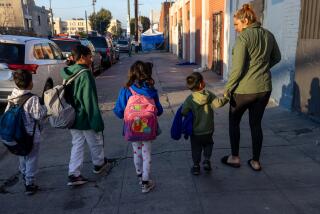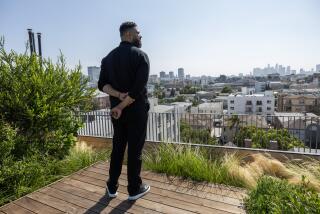Nonprofit Group Gets Large Grant
For the last decade, a nonprofit corporation has quietly aided immigrants struggling to survive in the low-income Westlake district west of downtown Los Angeles.
By piecing together scarce funding, New Economics for Women has provided affordable housing, job training and day care for mostly Latina women who hope to become self-sufficient. The agency operates three housing complexes for poor families and helps teenage mothers stay in school and hold down jobs.
On Wednesday, the group’s efforts received a major boost when Commerce Secretary William M. Daley presented the corporation with a $1.875-million grant for a primary health care services center that will also offer job training and other economic development assistance for the neighborhood around MacArthur Park and the nearby Pico-Union district.
The funds will be used to renovate a vacant, earthquake-damaged building on the 300 block of South Loma Drive, which is next to Casa Loma, the first housing facility that the corporation launched.
“We screamed and hollered” at the news, said Beatriz Olvera-Stotzer, president and co-founder of New Economics for Women. “This is what’s going to create the ability for us to open our doors next spring.”
The money is part of a $30-million grant the Commerce Department’s Economic Development Administration is giving to the mayor’s office for business earthquake recovery.
City officials said the grant is recognition that the corporation is a successful model of a community-based organization that assists families who are seeking a way out of poverty.
“NEW had the first housing project in the city that combined social services and housing,” Los Angeles City Councilman Mike Hernandez said. “They’ve changed the way the city thinks about housing. NEW has been the seed and the whole community has been changing around it.”
Founded in 1985, NEW emerged out of the growing needs of single working Latina mothers for affordable housing and jobs.
*
About 285 families live in the three housing facilities that combine affordable rents with support services for residents. Rents range from $86 to $450 a month, and the facilities also have on-site child care, tutors, after-school programs, literacy classes, financial management courses and parenting classes.
The original housing was designed with the input of residents in a process that has been emulated in other housing programs nationwide.
Residents advised against building walk-in closets because visiting relatives might consider them small bedrooms and ask to stay. Kitchens were built large so working mothers could spend time with children while they cooked. Two-story townhouses were changed to one-story flats after mothers expressed concern about children falling down stairs.
“It’s changed the lives of a lot of residents, including mine,” said Sandra Villalobos, program director at La Posada, the facility that serves teen mothers. Villalobos grew up in Westlake and became a mother at 16.
Many of the residents in New Economics for Women’s housing don’t have health insurance or access to clinics for prenatal or pediatric care, staff said.
“People just end up not going,” Villalobos said. “I have no words to tell you how this news makes me feel. It’s a dream come true.”
Besides medical services, the center is expected to offer “incubator space” for new businesses that first will work with the center. Technical assistance will be provided to fledgling firms in such industries as medical and computer technology. Small loans will also be offered for neighborhood businesses. Eventually, directors hope the center will employ 200 people.
“We believe we’re making history by tying an economic initiative program to health care and housing, but we’re also helping our families take care of problems before they get chronic,” President Olvera-Stotzer said.
Many of the residents, such as Cynthia Juarez, 19, have been buzzing about the opening of the center.
Juarez was living at home with her father until she moved to La Posada a year and a half ago. Because of the safe housing and day care for her 3-year-old son, she was able to finish high school, begin college part time and recently landed a job as a receptionist in a law firm.
Now, the new center will provide needed services for her son and other children.
“I think it’s wonderful because there’s not a lot of health care facilities that offer care for low-income families,” Juarez said. “Some women in our building don’t have any way of getting their children medication and physicals.”
More to Read
Sign up for Essential California
The most important California stories and recommendations in your inbox every morning.
You may occasionally receive promotional content from the Los Angeles Times.










